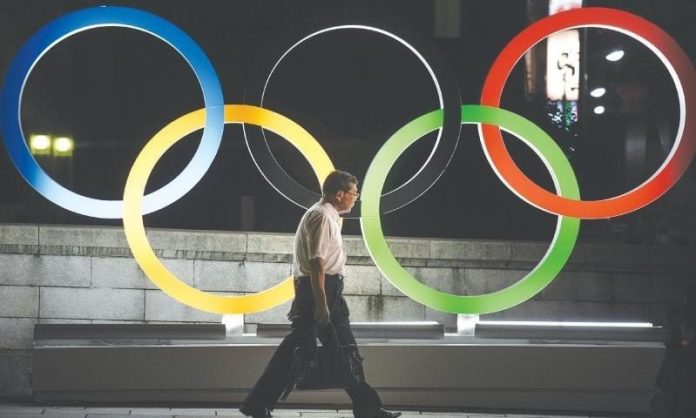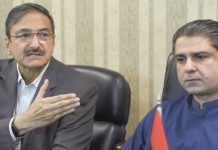TOKYO: Olympic athletes could face strict controls on movement and repeated coronavirus (Covid-19) tests under measures discussed on Wednesday by a task force charged with finding ways to safely hold the postponed Tokyo 2020 Games.
With less than a year until the Olympics, organizers and Japanese officials met for the second time with a long list of possible requirements on the agenda.
Athletes may have to submit a detailed plan of their activities in advance — and pledge to follow it — or save their whereabouts on a ‘map app’, according to documents prepared for the meeting.
They may also be required to undergo frequent coronavirus testing — including three days before leaving home, another on arrival, and others during their stay.
They will, however, be allowed to train during any quarantine.
“Tests are one of the most important issues from the two perspectives of securing safety and a sense of security for athletes,” Tokyo 2020 chief executive Toshiro Muto told a press conference. “We would like to create a system, or mechanism, to continue testing when they enter Japan.”
But, Muto said, ensuring the reliability of pre-departure testing in every country — and guaranteeing the accuracy even of high-precision PCR tests — will be a challenge.
Japanese athletes and other participants living in Japan would face similar requirements when travelling to training camps and competition venues under the planned measures, which were released after a meeting between the Tokyo 2020 organizing committee, the Japanese government and the Tokyo metropolitan authorities.
The 2020 Games were postponed in a historic decision earlier this year because of the coronavirus pandemic and are now set to open on July 23 next year.
Other restrictions floated in Wednesday’s meeting included athletes avoiding public transport where possible and also introducing social-distancing ‘pedestrian traffic lanes’ in venues and Olympic villages.
Common spaces such as lobbies, lounges and traditional hot spring baths might also be closed to reduce social contact.
When asked how the rules would be enforced, Muto said it depended on which restrictions were chosen.
The postponement of the Games has caused all manner of logistical headaches, forcing the renegotiation of contracts with venues and hotels, and efforts to keep sponsors on board for another year
The pandemic, which has infected millions worldwide, has cast a shadow over the viability of next year’s Games, even as Japan’s new Prime Minister Yoshihide Suga has emphasized their importance.
Earlier on Wednesday, Suga spoke to International Olympic Committee (IOC) President Thomas Bach by phone and had a discussion about holding a successful Games. Suga promised to cooperate closely on holding a safe event for athletes and spectators, his office said.
In the draft plan, Tokyo organizers also proposed to limit travel within Japan for athletes, who would register all domestic travel routes and would be transported to towns hosting national delegations and training sites in dedicated vehicles.
Muto also said he hoped deliberations with the IOC and various international sports federations would be finalized by December.
Japan has avoided the kind of explosive outbreak suffered by nations such as the United States, India and Brazil, with roughly 80,000 infections and about 1,500 deaths to date. The virus has killed about 964,000 people worldwide.








